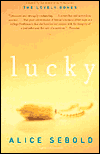
|
|

-Alice Sebold -------------------------------------------------------------------------- One night near the end of her freshman year at Syracuse University, Alice Sebold was raped while walking home through a park. From that experience comes Lucky, an account of the rape and the year that followed it, 12 months during which Sebold tried to readjust to college and family life. Six months after the rape, she spotted her attacker on the street in Syracuse, and thus began the long, arduous task of prosecuting him. This is not an ordinary memoir. Sebold is determined to tell the truth about her rape and its aftereffects. The book opens with a detailed account of the actual rape, which I at first found lurid, until I realized I had never read anything like it before except in fiction. Rape is still such a stigmatized crime that its victims' names are omitted from news reports; rarely do they tell their own stories. To share her experience in such a precise and detailed manner is an act of courage. After the rape, Sebold finds a huge gulf has opened up between herself and those around her, those who have not been raped. No one is sure how to treat her, and Sebold hates the silence and embarrassment that seems to creep into every conversation. Even her own father admits to believing that, for a rape to occur, the woman must in some way be complicit. Home for the summer, Sebold feels alienated from the "nice boys," who now can barely look at her, and family relations, which were never easy (her mother is prone to panic attacks, her father is aloof), are now further strained. Back at school in the fall, Sebold finds that she has unwittingly achieved a sort offacelesscelebrity; although her anonymity was never officially compromised, many know her name, if not her face. Having moved to a new dorm, she is stunned when people say things like, "You moved here from Marion [her old dorm]? Did you know the girl who was raped?" She is also surprised to learn that many people assumed she would leave school. The response they expect from her is shame; what they get is defiance. Sebold has begun taking classes (two with the poet Tess Gallagher and one with fiction writer Tobias Wolff, both of whom turn out to be tremendously supportive) and reestablishing a social life when she runs into her assailant on a city street. (He greets her casually, as if they'd once dated.) The second half of the book is devoted to his prosecution — her identifying him in a police lineup, the preliminary hearing, the trial. The prosecutor tells Sebold she is unusual for sticking with it, that most rape victims give up at some point and drop out of their cases. But Sebold is determined to get her life back and to make the rapist pay for what he has done. This section of the book is gripping in part because Sebold is a neophyte in the criminal justice system and makes mistakes along the way that might increase her attacker's chances of being acquitted. Because of the facts in the case — that Sebold did not know her attacker, that she was beaten, and that her hymen was torn in two places — there's no question that she was raped. The defense's strategy, therefore, is to throw as much doubt as possible upon her identification of the rapist. It proves to be much harder than she thought it would be to prove that the man that she has identified is actually the man who attacked her. Sebold titled her book Lucky because the police told her that another girl raped in the same park recently had also been murdered, and that compared to her, Sebold was lucky. The title is meant to be ironic, but in fact she is lucky in many ways: She survives her ordeal, her case goes to trial (which very few rape cases do), and in the end her assailant is convicted. Sebold becomes a sort of hero in the Syracuse police department, which turns out to be a mixed blessing a year later when her best friend and roommate, Lila, is raped and the investigating officers seem more interested in congratulating Alice than pursuing Lila's attacker. Unfortunately, Sebold includes an epilogue to her story that covers more familiar territory — substance abuse, post-traumatic stress disorder, therapy — and is weaker than that part of the narrative that is uniquely hers. Because of her rape, Sebold experienced college in a very different way than most of her middle-class classmates, and her account would have been perhaps more effective if it had ended with her graduating from Syracuse, damaged but a survivor. Still, she continues to experience the rest of her life differently, too. She is now aware of two worlds, one damaged by the intrusion of violence, the other not, and she knows she can never go back to her old pre-rape existence again. --------------------------------------------------------------------- *MY REVIEW* Very moving and powerful. There were some slow parts but it seemed to go by very quickly. It was amazing to see how this woman's life changed after her rape and how she is dealing with it for the rest of her life. If I was a rape vicitim I would deifinitely read this book for inspriation because through all the hell Alice went through she managed to put this horrible event behind her. |
|
|
